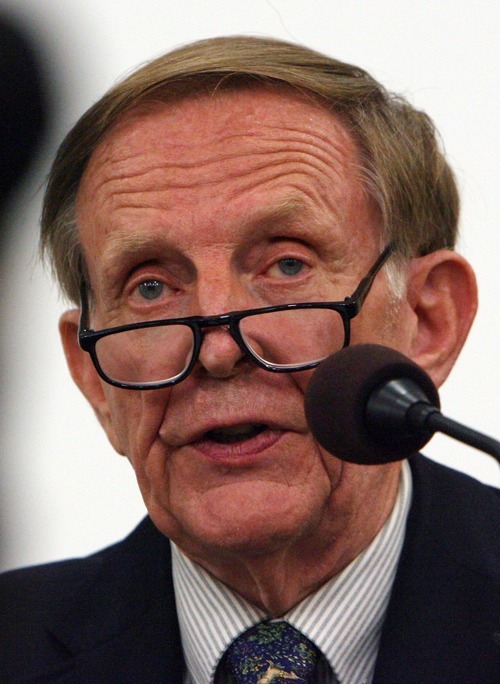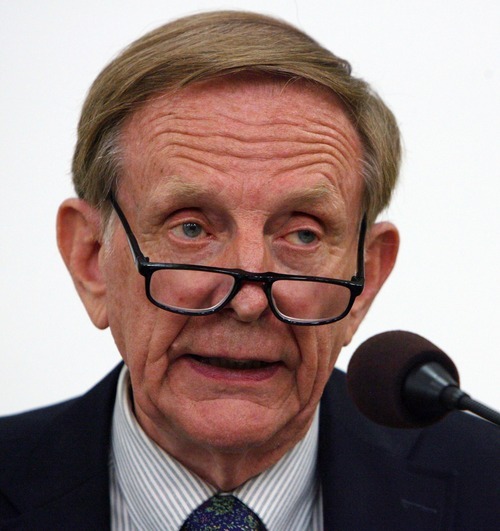This is an archived article that was published on sltrib.com in 2011, and information in the article may be outdated. It is provided only for personal research purposes and may not be reprinted.
If Mormon politicians were living their religion, they wouldn't engage in name-calling against their opponents or verbally attack any officeholder, especially the commander in chief, a prominent LDS historian said this week.
After all, Mormonism maintains unity by fostering lively, candid debates within church-appointed councils, followed by unanimous support once a decision has been made.
No wrangling for position. No partisan debates or religious schisms. And certainly no personal critiques of authorities.
Such a model clearly would not work in the rough-and-tumble of U.S. politics, Mormon scholar Richard Bushman said, but it should affect how LDS elected and party officials behave.
"I sorrow to hear my fellow Latter-day Saints resort to the demeaning language that has degraded political discourse in our time," Bushman told a packed audience at the University of Utah's Union Building. "Should not Mormons, with their tradition of working together, lead the [vanguard] in these calls for moderate speech and collaboration? Should they not live their religion seven days a week by extending the respect they afford church leaders to other kinds of authority?"
Sen. Orrin Hatch doesn't engage in personal attacks on the president or any other elected official, said the Utah Republican's spokesman Mark Eddington. "Senator Hatch looks for the good in people. He is measured in what he says. But if he disagrees with a policy, he doesn't hesitate to criticize that policy and offer an alternative."
Hatch, who is Mormon, once called President Barack Obama's health-care overhaul a "dumb-ass program." But the senator, his spokesman insists, is careful to say that he doesn't dislike the president personally.
Bushman may be "on to something," said Quin Monson, Brigham Young University political scientist, though he doubted the LDS system could be much of a model for the nation.
Those who sit in LDS councils share underlying goals and assumptions, making it easier to arrive at consensus, Monson said. "Being on a council is a pretty congenial experience. It's not as if there are sharp differences or a lot of shouting."
Still, he said, there is a tension in Mormon teachings about individual choice versus the faith's communal ethos.
"We are working together to build God's kingdom," Monson said. "That's where civility comes in."
Ben McAdams, a state senator from Salt Lake City's Avenues and a Mormon Democrat, said decorum and respect for elected officials should be the norm in U.S. democracy. In today's world, however, "we reward people who are willing to be bombastic."
Still, America's political system is built on vehement discourse, McAdams said. "The Founding Fathers didn't want to eliminate it; they wanted to harness it. Today, we all want what's best for the nation; we just have different ideas on how to accomplish that. "
Bushman, emeritus professor of history at Columbia University and a widely respected biographer and writer, presented his provocative point of view in a speech, "Mormonism and the Public Good," as the annual David P. Gardner Lecture, sponsored by the U.'s Tanner Humanities Center.
He began by decrying the seemingly intractable positions and caricatures that nearly derailed this summer's debt-ceiling resolution. But such rancor is hardly new.
The divide between pro- and anti-government forces is so "deeply ingrained in the national psyche," Bushman said, it is "grounded in the very nature of our national political culture."
And it all started with the country's two founding documents: the Declaration of Independence and the U.S. Constitution.
The former outlined reasons for breaking with a monarchy, viewing with suspicion any "centralized, imperial government," Bushman said, while the latter saw government as "the people acting together to promote the general welfare."
One was built on fear of tyranny, the other on faith in the process.
These opposing impulses have tugged Americans in different directions for centuries, he said, and continue to do so today.
A number of Utah newsmakers are trying to tame those clashes. A bipartisan group — led by Salt Lake City Mayor Ralph Becker and Lt. Gov. Greg Bell — has launched a civility campaign in hopes of lifting the level of public discourse in the state.
The Utah Civility and Community 2011 Initiative is the brainchild of an advisory council comprised of luminaries from civic organizations, faith groups, academia and politics. LDS Church-owned media outlets also have launched civility drives on issues such as immigration.
So how could a religion such as Mormonism, with its vastly different governance, affect the public good?
The 14 million-member global faith does have a record of getting things done, Bushman said, and that is due partly to its emphasis on unity.
"Its instinct is to preserve itself as a corporate body and not to fragment into contending factions," Bushman said. "Mormons value the whole more than any of its individual parts, precisely what is missing on the American political scene. ... They do not want to sacrifice the church as a whole to some position they personally value."
That's the opposite of what is happening in gridlocked Washington. Politicians seem so wedded to their positions, they struggle to compromise — even in areas where they largely agree.
An episode such as the LDS Church's support for California's Proposition 8, defining marriage exclusively as between a man and a woman, is emblematic of the faith's approach. The issue caused conflict and division but did not trigger a schism.
"It offended the consciences of many Mormons to deny gays the right to marry," said Bushman, who was the Howard W. Hunter Chair of Mormon Studies at Claremont Graduate University in Southern California during the 2008 campaign, "but with few exceptions, Mormons did not throw over their membership or attack fellow members who complied with church policy."
They went along, he said, and the church weathered this "potential strain on its unity."
Within the Utah-based faith, respect is given not necessarily to an individual, but to an office. Members stand, for instance, whenever the church's president enters the room.
Latter-day Saints should apply this same principle to the highest office in the land, no matter who occupies it.
"Mormons hold to the idea that the United States Constitution is a godly document," Bushman said. "Mormons should honor those who come to power through due constitutional processes, including members of the opposing party, if only out of respect for our founding charter."
LDS Church founder Joseph Smith ran for U.S. president himself in 1844. His political platform, Bushman noted, recommended a pattern of bipartisanship, stating that "unity is power; and when I reflect on the importance of it to the stability of all governments, I am astounded at the silly moves of persons and parties to foment discord in order to ride into power on the current of popular excitement."





